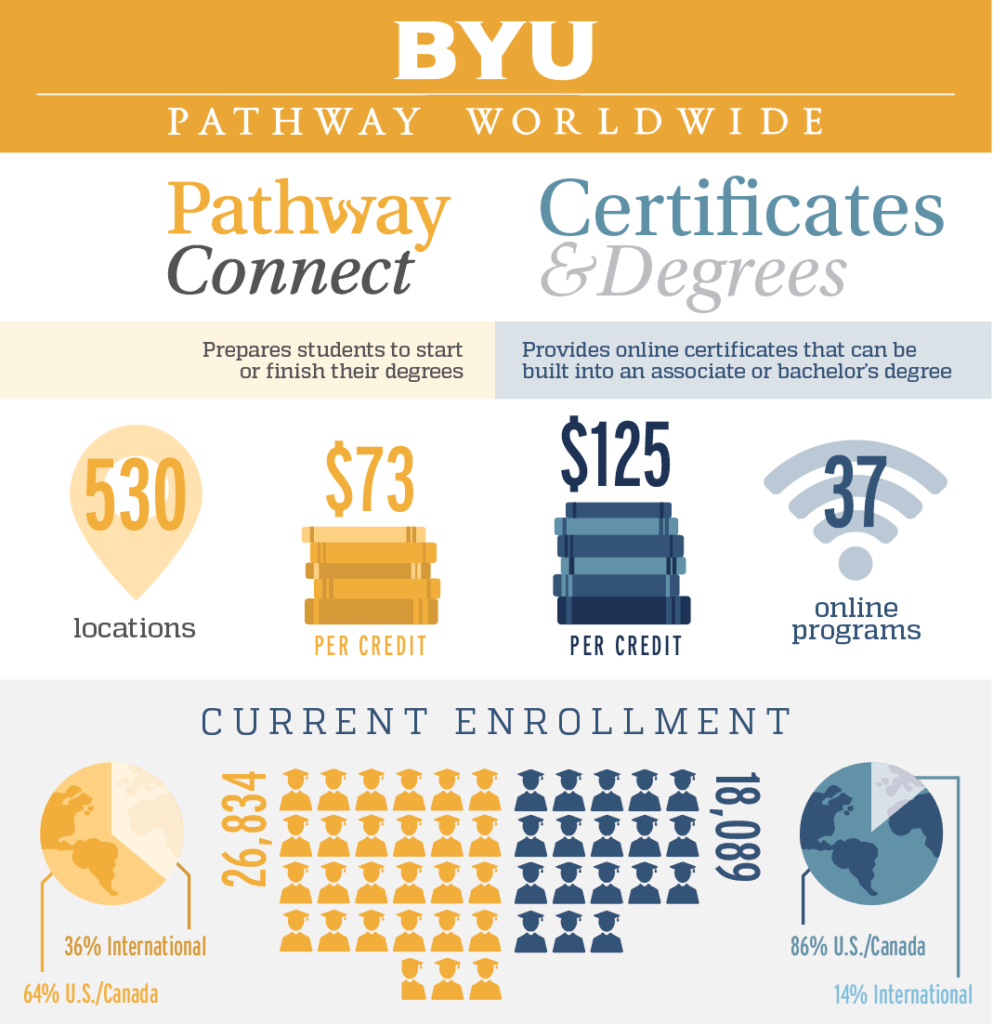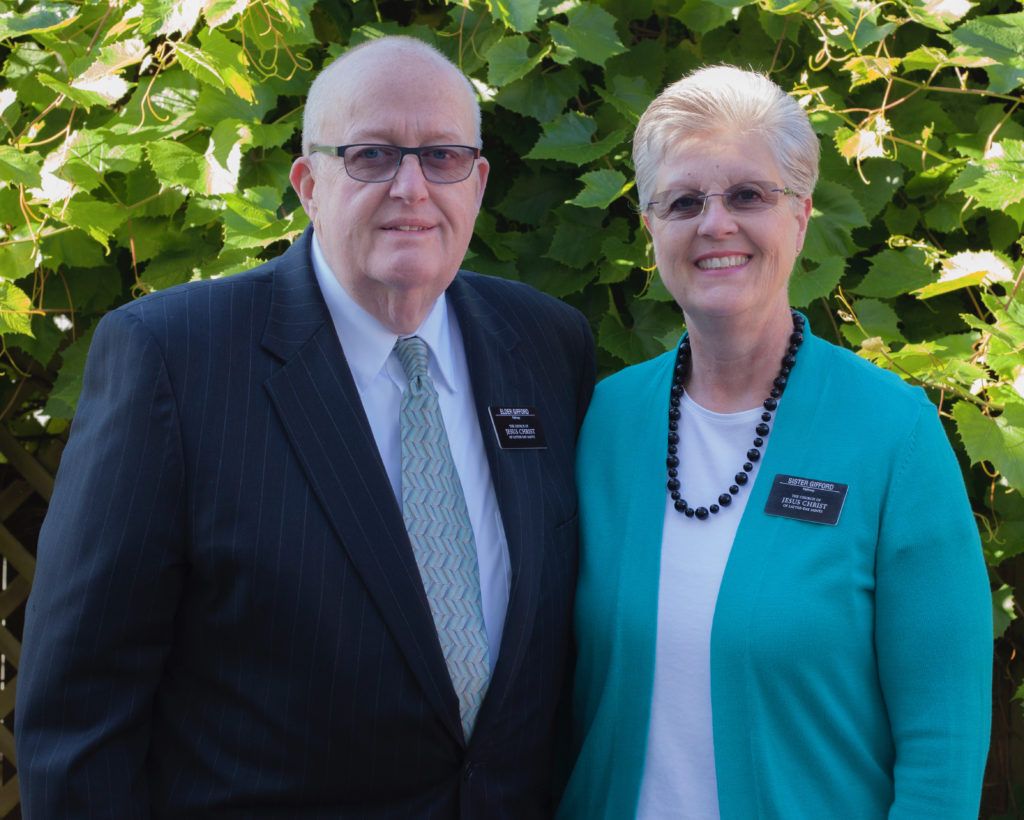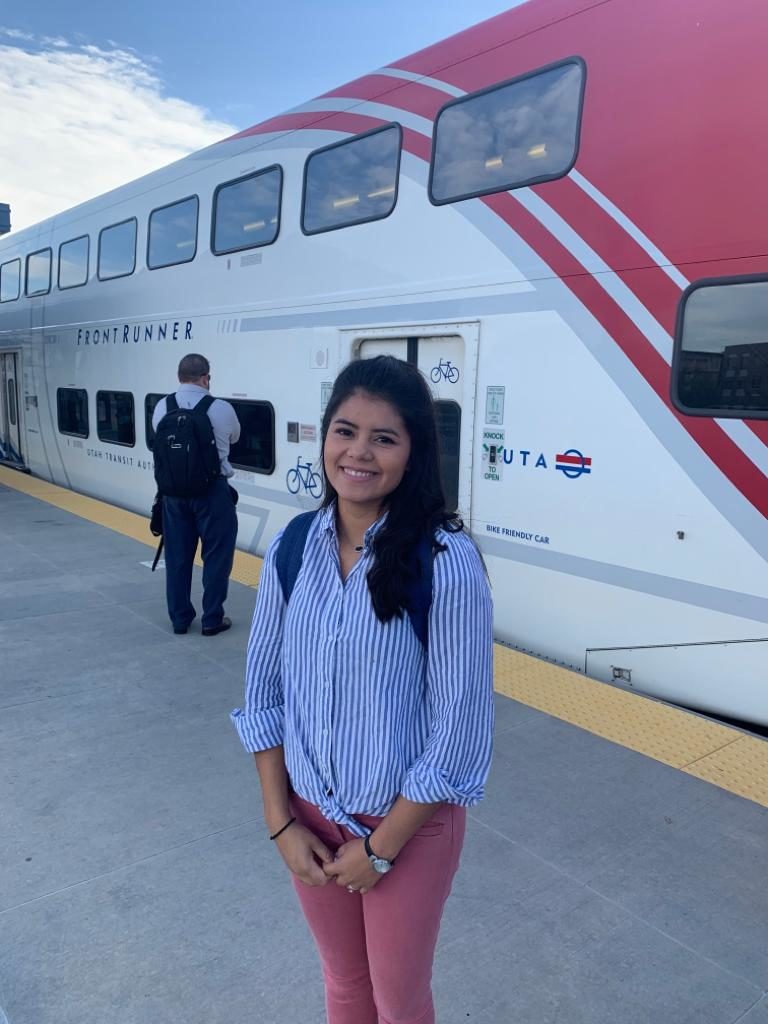See also “Online learning and degrees attracting more students“
Heather Nielsen was paying $3,000 to take three courses at Utah Valley University. She was working full time, struggling with mental illness and her grades were dropping.
“I didn’t feel like I was valued as a student there. I just felt like another tuition payment,” Nielsen said.
She no longer qualified for financial aid and couldn’t afford UVU’s tuition costs. While trying to find a solution, Nielsen found BYU-Pathway Worldwide, which provides online higher-education programs. The cost to attend? As low as $73 per credit for students who are members of The Church of Jesus Christ of Latter-day Saints.
BYU-Pathway Worldwide was established in 2009 (originally as the Pathway program at BYU-Idaho) in an effort to extend higher education to those who would not be able to attend a BYU school or local school in their area.
“There was obviously a need out there for members of the Church to receive a gospel-based education in the online environment,” said J.D. Griffith, the vice president of administration for BYU-Pathway Worldwide.
Griffith helped pilot the program while working in BYU-Idaho’s Department of Continuing Education. Griffith said the program aims to build confidence, hope and a culture of continuous learning.
BYU-Pathway is split into two options. The first option, called PathwayConnect, is one year long and intended to prepare students for a university degree, build spiritual confidence and teach foundational academic skills, Griffith said.

The second program is usually taken after or separate from PathwayConnect and follows a unique certificate-first format, according to Griffith. Usually, students who have taken some university courses, are ready to dive into a degree and are familiar with online learning find this option a good fit.
The certificate-first approach costs $125 per credit for members of the Church and leads to a bachelor’s degree. Students who start with PathwayConnect keep the lower $73 tuition rate. Griffith said the certificate approach was created after numerous focus group participants shared that they had fears of going back to school, a low ACT or SAT and uncertainty about starting college for the first time or after many years.
“We asked ourselves, ‘How can we develop some small wins as we help people get to their associate’s and then their bachelor’s?” Griffith said.
Once students finish their first 15 credit hours they receive a certificate. Another certificate is given after finishing the credit amount for an associate’s degree. Once a student has three certificates they receive their bachelor’s degree.
This approach allows students to avoid the trap of leaving higher education with nothing but a lot of credits and debt, Griffith said. Only 60% of college students at four-year institutions graduate with their degree within six years, according to the National Center for Education Statistics.
Griffith believes BYU-Pathway Worldwide can provide a solution to the increasing dropout numbers and tuition costs. The cost per credit to enroll in BYU-Pathway is approximately half the cost of traditional universities, according to their website.
The format of BYU-Pathway Worldwide is one aspect that Griffith said makes it a successful alternative to current higher education.
“We’re so steeped in the tradition of education that it’s hard for people to look past going to a campus, moving away, moving into a dorm room and enrolling in the campus format. Whereas with online education, the outcomes are just as significant and can still provide that educational opportunity,” Griffith said.
Though the program is taught almost exclusively online, students are still encouraged to meet once a week either at a Church or Institute building with other students. These gatherings are led by senior missionary couples from the Church.

“Our job is to help mentor students in the sense that we help and encourage them, answer questions and direct them to other sources of information,” Lyman Gifford said.
Gifford and his wife, Dee, have served as service missionaries with BYU-Pathway Worldwide for four years in both Washington and Utah. They currently serve in the Eagle Mountain, Utah, area.
The Giffords are now helping pilot classes that allow students to opt in to an online weekly meeting through the video conferencing program Zoom. BYU-Pathway Worldwide tested this all-virtual approach for a year before inviting the Giffords to help lead it.
Despite not having to physically show up to a classroom, Gifford and his wife said there is still a lot of preparation required. Missionaries working with virtual meetings have to make sure the technology is working and that the students are able to sign in.
“We’ll talk to the students about all the great things they did, and then we’ll make a suggestion or two of what they can improve on,” Gifford said.
About 15-20% of PathwayConnect students are choosing to attend virtual weekly gatherings instead of face-to-face meetings, Gifford said. The virtual meetings are a great option for those not physically close to a Church or Institute building.
President of BYU-Pathway Worldwide Clark Gilbert, said about 40% of PathwayConnect students are international and that percentage is growing rapidly. A virtual approach is a great option for international students who are often unable to physically meet, he said.

Though the program was initially intended for students aged 18-24, people of all backgrounds, ages and demographics have enrolled in the course and received certificates and degrees.
Adela Osborn participated in BYU-Pathway Worldwide while living in Guatemala, taking a few classes and working on improving her English.
Osborn said a good education is not cheap and saw BYU-Pathway Worldwide as a low-cost way to receive quality higher education.
“The underlying power of the program is how it creates hope and confidence in students; finding a population who didn’t think they could go to or finish college. It gives them the tools … to be successful,” Gilbert said.




